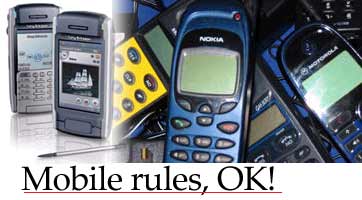
The report that Viren Rastogi and Anand Jain, whom the British courts have ordered to repay $300 million to duped creditors, have reinvented themselves as mobile phone salesmen reinforces my misgivings about a device that seems to bring out all that is most extrovert and inconsiderate in human nature.
Not that I seek a world of Trappist silence. Mobiles have their uses, especially in emergencies. The latest is reported from South Korea where parents can now check their children's movements through a phone with a built-in tracker using the global positioning satellite network.
I might even need one myself in lieu of a landline. But in any crowded room, no matter how august or solemn the occasion, a piercing ringing or staccato chirping will break out of someone's bag or pocket. The ensuing swell of "Shhhs!" can be equally infuriating.
"What we need is a mobile jammer as in Singapore and Hongkong," a Londoner told me the other day. The impression prevails that everyone in these places is armed with an instrument that he jabs at the noisy offender, and hey presto! the most animated conversation is cut off in full spate. Actually, everyone in the Far East clutches a mobile so desperately that Singapore long ago made driving and talking a punishable offence, providing the mobile was hand-held.
Britain belatedly followed suit last year. Now an extension of the ban to hands-free car phones is proposed, because the danger arises from the distraction of a conversation when the driver should focus only on the road. Research in the United States, where drivers talk a billion minutes a day on their mobiles (40 per cent of all cellphone calls), shows that wireless earphones don't make driving any safer.
The British are also poised to market what promises to be the ultimate silencer. Qinetiq, the defence ministry's research team before it was privatised, has designed an intricately patterned metal grid called the Frequency Selective Screen that filters certain radio signals. Camouflaged as wallpaper, it may be installed in hospital wards, theatres, operas or high security zones where a mobile might be used to set off an explosive.
Scientific ingenuity, stringent laws and strict policing can tackle only certain aspects of the growing menace. They cannot wish away the proliferation of mobiles or explain the mulishness of users like some members of a stately Indian club who jabber away into their instruments in the smoking room, ignoring angry looks as well as the bearer patiently holding up a "Please switch off your mobile" sign only a few inches away.
The unending talkathons mobiles promote do nothing to rescue the dying art of conversation. But they do draw attention to the speaker's consequence and imply his involvement in topics of pressing global importance that demand instant discussion regardless of time, place and occasion. Mundane obligations like duty and courtesy must yield to the mobile's insistence.
Shop assistants twitter away while customers wait for service. People cross roads clutching a fist to the ear, impervious to rushing traffic. Students whisper into mobiles in libraries and many a meal must be burnt to cinders because the housewife is too busy chatting to keep an eye on what's cooking.
Worst of all, everything that should remain private has burst into the public domain. No other invention can so drastically have reshaped human nature. The mobile has torn away all sense of discretion. It has stripped people of sensitivity, perhaps even of shame. Secret joys and sorrows are uninhibitedly flaunted before the world.
Passengers in the London underground especially are inundated with all manner of intimate information thrust upon them from all sides. "I told you to sell " thunders a man to his investment broker; "Oh Jeff, please!" pleads a girl with her hard-hearted boyfriend; "She never helps with the housework " complains a woman about her daughter; "It's m'mum" grumbles a boy. Salvation lies in pulling out your own mobile -- if you have one -- to match confidence for confidence.
Worldwide, there are 1.3 billion mobile users today. The British number has soared from nine million to 50 million in six years. Astonishingly, nearly a quarter of British children aged between seven and 10 have their own mobiles, and one in three is an addict, sunk in depression if no calls are received.
Adults are equally addicted. Singapore's prime minister, Goh Chok Tong, who steps down next Thursday, tells of a woman who desperately needed financial help from the state but ran up exorbitant mobile bills. "Must talk, lah!" was her defence.
Back to Rastogi and Jain who are at the centre of investigations into a $400 million fraud at RBG Resources, a London-based international metals trading firm they controlled until it went bust two years ago. They are negotiating deals to market and supply thousands of phones to British users. Three networks have granted re-seller licences to Tulip (UK) Ltd where Rastogi works and his wife and mother are major shareholders. Apparently, hundreds of Tulip staff in Delhi call UK customers to whom they sell several thousand mobiles each month.
The future, then, lies with Tulip and Qinetiq to create sound and silence. Its almost like the badge-making firm that made fortunes from two best-selling slogans. One read "I love Elvis", the other, "I hate Elvis."
TAILPIECE: Pointing to a roadside kiosk, a four-year-old boy told his grandfather, "That's where you go if you don't have a mobile", according to a letter in The Daily Telegraph.




